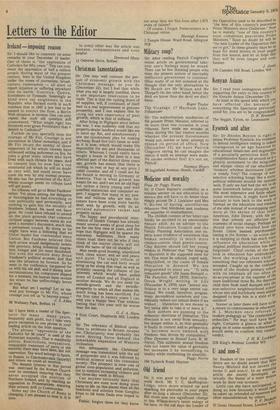Ireland—imposing reason
Sir: I should like to comment on some remarks in your December 15 leader. One of these is "the oppression of Catholics for fifty years." This can only mean the oppression of half a million people during most of the present century, here in the United Kingdom under the noses of journalists, broadcasters, cameramen — all alert to report injustice or suffering anywhere else on earth: Guernica, Quetta, Scottsboro or Tyneside. Seemingly as blind were our neighbours in the Republic who flocked north in such numbers that in 1947 a law had to be passed to restrict the flow; a Berlin Wall situation in reverse. One can only repeat the stale old question still unanswered: "What single right has Stormont ever given Protestants that it denied to Catholics?"
Further on you specially note the courage of Mr Fitt. Courage is not uncommon in Ulster nowadays, and if Mr Fitt incurs the enmity of those supporters of his whom viewers have witnessed setting policemen on fire, he joins a great many others who have lived with such threats for years. And to console him he now has a top ministerial job which he will no doubt do very well, but could never have come his way by any normal process. He also has the protection of the RUC whose courage needs no tribute (and will get none).
No tributes will go to Brian Faulkner either. Yet alone among the delegates at Sunningdale he had everything to lose politically and personally, and nothing to gain but the security of Northern Ireland. He need not have gone. He could have refused to attend on the plain grounds that common civilised usages between states do not need a moment's discussion, much less a permanent council. By doing so he might have won a following that no Ulster leader has commanded since Carson. But Faulkner believed that such action would dangerously isolate this province, bring industrial stagnation, hunger and yet more bloodshed. Not even his enemies deny Brian Faulkner's political acumen, and that was the situation he foresaw. So he went to the conference, bargained for us with his old skill, and if during later recriminations his composure slipped for a moment, his human lapse reveals the strain he has unflinchingly borne so long.
But what am I saying? Let us instead pay homage to Mr Fitt, whose courage you tell us "is beyond praise." J. S. Allen 66 Wallasey Park, Belfast 14


























 Previous page
Previous page